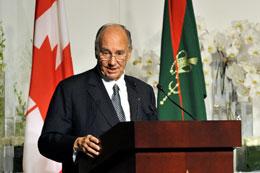Ismaili Muslims promote equality, justice and education

Commentary
By Ruth Ramsden-Wood
This year is the Diamond Jubilee of His Highness the Aga Khan, the leader of the world's Shia Ismaili Muslims. I would like to express my gratitude to the Ismaili community for their exceptional commitment, under the Aga Khan's leadership, to the betterment of the human condition globally and in Canada.
It has been my privilege and honour to witness this work in Calgary and to travel to Pakistan to provide due diligence on some International educational projects operated by the Aga Khan Development Network (AKDN). This Network is a politically neutral, non-denominational agency, founded by and operating under the leadership of the Aga Khan. I have been humbled to experience the AKDN's deep commitment to social, economic, and educational projects in some of the poorest and most vulnerable countries in the world.
In a barren, forlorn region outside of Karachi, we stood on the site where a modern University for health and research now stands. We traveled to a region called Gilgit in the far north of Pakistan, between India and China, bordered by the Himalayas, where we visited a school for girls, started by the AKDN. The students, daughters of illiterate local farmers, study in the bleak and cold in a school that is heated by smelly, portable kerosene heaters. We arrived on an 8° Sunday afternoon and encountered them studying outside in the afternoon for light. They shared their dreams of attending Yale University or Stanford, to become astronauts, engineers, pilots and teachers. We all know what having hope, goals, mentoring and role modeling do to contribute to achievement.
The Ismaili Muslims promote equality, justice and education. As long ago as 1947, the grandfather of the current Aga Khan announced in India, "If you can only educate one child, educate your daughter for she will teach the others." Their strong belief system is that ignorance, poverty, despair and, indeed, terrorism itself, are best tackled through education and improved literacy. This is why the AKDN's initiatives span 30 developing countries, including 10 of the poorest countries, such as Pakistan, Bangladesh, Uganda, Tanzania, Zanzibar, and Afghanistan and why the AKDN works to improve literacy rates. They promote health care by training young women to go into rural areas to counteract prevailing myths about health and nutrition. The AKDN also focuses on economic development and revitalization in these countries to improve quality of life.
Ismaili Muslims share our values of service, ethics, civic responsibility, and inclusiveness. In 2014, the Aga Khan instituted the gift of Time and Knowledge as a legacy of his Golden Jubilee whereby many Ismailis travel to spearhead and build capacity of new projects, such as dentistry programs, schools and the like.
They have enriched our Canadian mosaic by helping us to bridge divides. The Global Centre for Pluralism in Ottawa, the Aga Khan Museum in Toronto, and the soon to open Aga Khan Gardens in Edmonton are testaments of the contributions of His Highness throughout the world.
The Aga Khan received the first Adrienne Clarkson Prize for Global Citizenship in 2016 in recognition of his lifetime of work on improving the levels of education and health around the world. The Institute for Canadian Citizenship, co-founded by Madame Clarkson and John Raulston Saul, of which I am a board member, works on the principles of inclusion to enhance active citizenship among our new Canadian citizens.
In Calgary, I have experienced how community service and "giving back to one's community" are part of the Ismaili DNA. Ismaili youth are raised with the expectation of doing volunteer service and they are involved in a myriad of projects. When 2400 Afghan refugees came to Calgary, not only did the Ismaili community pledge to support them but they promised to stick with arriving families until they were functioning successfully in Calgary. This included helping with their accommodations, accompanying them to school parent-teacher interviews, helping to translate our Western culture to them, instilling pride in Canadian institutions among the new immigrants and helping them to learn or improve their English.
When I want to be inspired, I think about Molodad in Gilgit who is the head of the Professional Training Development Centre there. He is from a farm family of 9 children and was the only one to attend school until grade 8. He eventually attained a PhD. from the University of Toronto and returned to work in Gilgit. When he goes to bed at night, he asks what else he can do to give back. He told me, "I give with my heart, my soul, my mind, and everything I have so we can all be successful".
In the context of our current political climate, I look to the Ismaili community, intent on helping people reach their personal potential through education, as a shining example of hope and optimism for the future of our world. This Diamond Jubilee is certainly occasion for us all to celebrate.
Ruth Ramsden-Wood, is the Former CEO United Way of Calgary and Area and a Current Board Member for the Institute for Canadian Citizenship.









